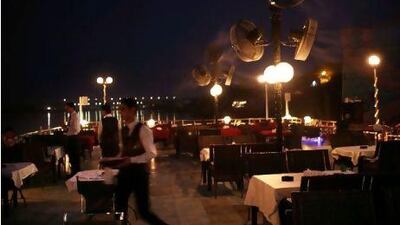Most people know that for truly great pizza you should head for Naples, or at a pinch Rome. But Baghdad? Yes, you can occasionally escape the chaos of the Iraqi capital in one of its unexpectedly good pizza restaurants.
"I have been making pizza for so many years now that I come up with recipes in my sleep," says Waleed Al Bayati, the owner of Pizzeria Napoli. "When I wake up in the morning, I get into the kitchen and roll up the dough, sprinkle on the ingredients and place it in the oven."
Mr Al Bayati's restaurant, whose walls are adorned with pictures of Rome, is in the Jadriya neighbourhood of southern Baghdad where Jalal Talabani, Iraq's president, and several notable government ministers live.
His menu, which boasts "The Only Hardwood Fired Brick Oven Pizza On This Side of the Tigris", includes a long list of pizzas including marinara, calzone and capricciosa. Mr Al Bayati's best-selling pizza, however, is a simple but delicious thin-crust aubergine, squash and olive combination for US$11 (Dh40).
He says he imports his buffalo mozzarella cheese from Italy.
Pizzeria Napoli is just one of many restaurants that have opened since the ousting of Saddam Hussein in 2003.
In the nearby Karada neighbourhood, shoppers cluster around fire pits to buy masgouf, the barbecued carp that is a favourite among Iraqis.
"Iraqis love to eat," says Amer Fayad Mousa, a 27-year-old contractor waiting for his fish. "As long as you can think of a new and creative idea, it will sell."
And it's not just restaurants that are opening. The Rasheed Hotel, Iraq's only luxury commercial lodging inside the Green Zone, reopened this month to cater to foreign investors. The Rasheed and five other hotels were closed for almost a year to be renovated ahead of the Arab League summit that was scheduled to take place in March but was put off.
The Rasheed's renovation, which included imported wallpaper and glitzy chandeliers, cost $60 million. The hotel is now managed by the Kempinski group of Switzerland.
And plush nightclubs operate between 12am and 6am, closing their doors during the curfew, like it or not. The most notable is Khayyam, located in the Sunni district of Adhamiya and popular with sharp-suited businessmen.
According to the government-run national investment commission, Iraq could attract $500 billion of foreign financing over the next five years, much of it in the oil and gas sector, but nearly 30 per cent of that could be drawn to the hospitality industry.
Despite the attractions, the legacy of decades of war are present everywhere. Baghdad feels like a giant military camp or a military video game. Endless checkpoints congest traffic in the city, and traffic lights are either switched off or not working, so the police direct traffic.
Humvees and armoured vehicles occupy the city's pavements. Baghdad feels safe on the surface, but Iraqis know better than to let their guard down.
Hadeel Al Sayegh, who is of Iraqi descent, reports from Abu Dhabi. halsayegh@thenational.ae

